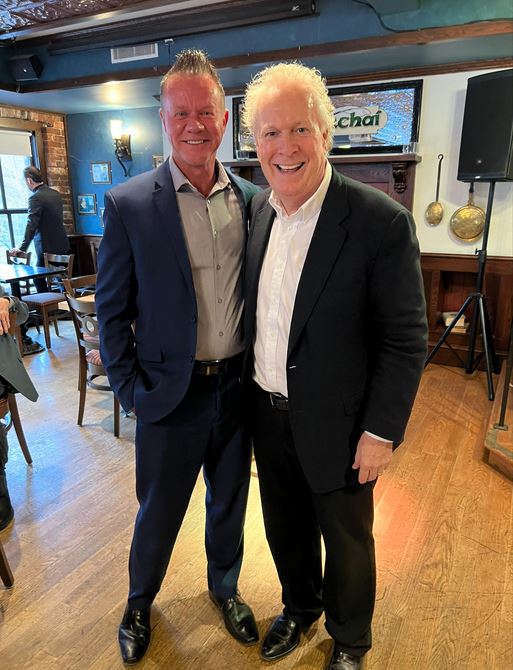By Andrew Macdonald
There are seven contenders in the Conservative Party of Canada leadership race, including Jean Charest, a former leader of the national Progressive Conservative Party and former premier of Quebec.
The thinking in Nova Scotia political circles is that Charest, 63, is the best candidate to return the Tories to power, but the front-runner in the leadership race is Pierre Poilievre, a 42-year-old MP from Ottawa.
Charest was in Nova Scotia earlier this week, campaigning in stops at River Pub in Bridgewater, Forties Community Centre in the Forties near New Ross, and at the Old Triangle Pub in Halifax.
Along with an appearance on Seaside FM in Eastern Passage, Charest conducted an interview with The Notebook during the whirlwind tour,
“It’s been a great tour. If you’re going to be in Nova Scotia, you have to go to a pub, otherwise, it would not be Nova Scotia,” says Charest with a smile.

Jean Charest, right, with Mark Boudreau while making a campaign stop at the Old Triangle Pub in Halifax, earlier this week.
Charest was in the cabinet of Brian Mulroney, who governed as prime minister from 1984-1993, It was the last Progressive Conservative government, one in which Mulroney was a ‘Red Tory’.
“He’s a good friend,” says Charest.
I asked Charest if he is a Red Tory, or a Blue Conservative.
A Red Tory supports social programs with an eye on government expenditures, while a Blue Conservative is on the right-wing political spectrum.
“I am a Conservative, period, no hyphenation for me. We have had enough of the hyphenations. And, what does that mean? I believe in fiscal conservatism. I believe in a market-based economy. I believe in economic policies that promote growth for the purpose of increasing the revenues for families. I believe in law and order and I believe in supporting policies that are good for families, and I believe in a federal system that respects the jurisdiction of the provinces,” he tells The Notebook.
“That for me is what it means” to be a Conservative, he says.
“A political party is a living institution. It evolves through time, with different leaders. So, the new leader will take the party as it is — as a living institution,”

Jean Charest gathered supporters during a campaign stop at the Old Triangle Pub in Halifax.
The Tory leadership race will be decided this September and Charest is not seen the front-runner.
“I like being the underdog. No one really knows in the race (who is the front-runner). The media think I am not the front-runner, that I am the underdog, but I have always been the underdog all my life. It’s been really good to me, I’ve always been the underdog. I like surprising it up and winning,”
After the Nova Scotia tour, Charest was in St. John’s, Nfld., before returning to Ottawa.
“On the ground here, it is all very positive and the reaction has been very good,” Charest says of his East Coast tour. “Canadians in this neck of the woods and Nova Scotia, particularly, want a national government and they like that my leadership will unite the party and I will make the party win.
“In the end, who among us candidates will allow us to win the next election, that is one of the key areas the party has to decide.”
I asked Charest how he can unite the fractured party, formed by the Canadian Alliance merger with the PC party in 2003.
“Well, by focusing on what the next step will be. First of all, I am very respectful of those who may not agree on everything on policy. We are all like-minded people on values…that we all share. Some people might have different views on different issues, but in the end, we all want to be part of the same family, and we want to be a national government in a national party,” he adds.
“That is what Conservatives want,”
Charest notes the Tories have lost three consecutive elections in the country.
“Now it’s time to win. And if we want to win, I am the one who is going to make the party win by focusing after becoming a leader on a single issue and that is how we prepare for the election campaign, how we govern,” he tells The Notebook.
“One thing we know about this campaign is that there is a choice. Either we are going to have a leader who is going to bring us down a road of American-style politics — of wedge politics — or we are going to be Canadian.
“I also believe the party wants a leader who believes in law and order, which is what I believe in, and who is going to be supporting Canada or supporting blockades. If you want to be the leader and be a leader of a party you have to respect the law.,”
Charest has the support of South Shore MP Rick Perkins, former national party executive director, Janet Fryday Dorey, of Hubbards, and Jim David, the 35-year long executive director of the provincial PC party. Also among the organizers for Charest is former Cape Breton candidate Fiona MacLeod.
Perkins was an early backer of Charest, even before Peter MacKay withdrew from the race, as Notebook has reported previously.
Charest is keen on this group of party organizers working to get the vote out for him in Nova Scotia and across Atlantic Canada.
“All of these folk are fantastic people, who are very much rooted in Nova Scotia politics and in national politics and they know the country very well. They know how important it is to recruit new members because in the end, it is all about new members,” he says.
Peter McCreath, who was South Shore MP from 1988 to 1993, attended Charest’s stop Bridgewater with his wife Judy, and another former MP, Gerald Keddy, attended the campaign event near the community of New Ross, which is 30-minutes from the Village of Chester
“We have to be able to recruit new members by June 3, and get them to vote — a vote that will be decided on Sept. 10,” says Charest.
He says the leadership ballot question is “whether we are going to be a national party, and if the answer is ‘yes’, elect a leader who is able to make us a national government. I want to move this party from being a national party to a national government.”
Charest was a Liberal premier of Quebec, something his leadership opponents are making hay of, but Quebec has no real Conservative or Liberal party, like elsewhere in Canada; there is only a federalist party and the separatist forces.
Charest says being labelled a Liberal sympathizer “is hogwash. The Liberal Party of Quebec is a coalition of federalists that I had led to pushing back against the separatists. Preston Manning and Stephen Harper thought it was a good idea that I lead the Liberal party in Quebec because Lucien Bouchard wanted to hold a third referendum, and I was successful in stopping it.”
And, Charest says he has a record of being a fiscal conservative as Quebec premier.
“When the Liberals left power, and the new government came in, they were left with an $8 billion surplus, and a higher credit rating in Quebec than Ontario,” he notes.
“If anyone has a record of being a fiscal conservative in this country, then I am that person.”





